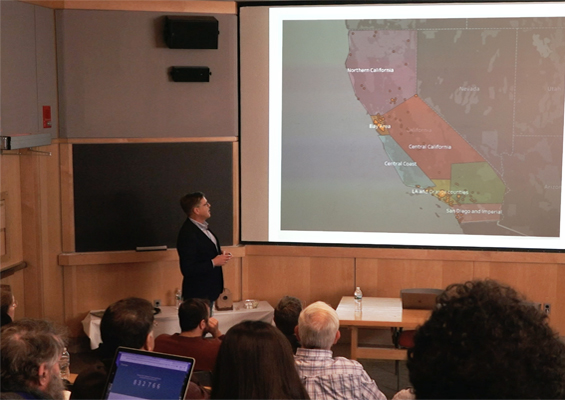
There has been much debate lately over the hegemony of the four-year college degree. Massive open online courses, colloquially known as MOOCs, have contributed greatly to this questioning as educational technology has grown rapidly. Platforms such as edX, Coursera, and Stanford’s Lagunita allow the public to take classes from elite educational institutions, such as MIT and Stanford, in the form of MOOCs.
Mitchell Stevens is the Associate Professor of Education and Director of the Center for Advanced Research through Online Learning at Stanford, and in his xTalk on October 26 he focused in on Coursera and Lagunita, the online educational systems developed at Stanford.
What do people use MOOCs for?
MOOCs have often been argued to be bad college classes, but this is in fact just one way of conceptualizing it; when MOOCs were still a relatively new idea in 2012, they were lauded for their ubiquitous, free nature that provided educational classes from elite universities. As MOOCs have grown in popularity as a way to enhance resumes or simply expand intellectual knowledge, this question arose of how people use MOOCS. Stevens and his team conducted interviews with 60 California residents of diverse educational backgrounds who had watched at least 25% of the videos of one Stanford MOOC. Here are the main reasons people used MOOCs:
- To enhance and acquire skills – one manager of a consulting firm used MOOCs to learn SQL, as he had not learned it in college and it was growing in popularity in his field.
- To help with self-care or self-improvement – one 35-year old consultant used MOOCs to destress after long work hours while also learning something new.
- To gain information to enable a life transition – one mother used MOOCs to try out courses before enrolling in a Master’s degree program, while another user took a MOOC course to learn how to be a better caregiver for his wife.
However, the value of MOOCs as credentials remains ambiguous. Some say that getting the certificate after completing a course is a satisfying way to show for the effort put into it while others feel that it does not matter if they pass the class, since the purpose was to learn something new. For MOOC providers too, there are both opportunities and risks to consider as their user base grows.
As the discourse around what a degree means is rapidly changing, it is important to note that the meanings and utilities of MOOCs are also varied and continually evolving. Issues to consider include whether the value that people get through MOOCs needs to be related to learning, and whether there can be new metrics for utilization and engagement. Some claim that MOOCs may soon take over the college degree, but this remains to be seen as MOOCs have progress to be made in gaining value as credentials; a college degree still holds more regard in this area, along with providing much non-academic learning as well. The centuries-old institution of higher education seems safe for now.